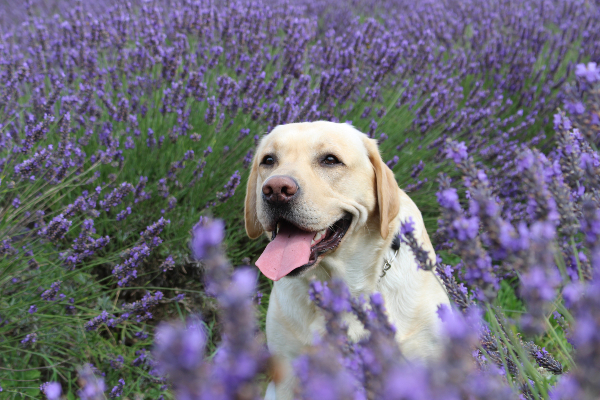Yes, it is generally safe for dogs to smell lavender as it has a calming effect on them. Lavender has been known to help reduce anxiety and stress in both humans and dogs, making it a popular choice for aromatherapy.
However, it is important to note that some dogs may be sensitive to strong smells, so it is best to introduce lavender gradually and observe how your dog reacts. Additionally, it is essential to ensure that your dog does not ingest any lavender products as it can be toxic in large amounts.

Credit: blog.healthypawspetinsurance.com
Understanding The Sense Of Smell In Dogs
Dogs and lavender: a common query pet owners have. Understanding the sense of smell in dogs is crucial. The importance of scent for dogs cannot be underestimated. Dogs have an exceptional sense of smell compared to humans. They perceive different scents in a whole new way.
Lavender, for instance, can be calming for humans, but the same may not apply to dogs. Each scent elicits a unique response in our furry friends. So, while lavender may not be harmful to dogs, it might not have the same effects as it does on humans.
As responsible pet owners, it’s important to research and consult with a veterinarian about the potential effects of different scents on our canine companions.
Exploring The Benefits Of Lavender For Dogs
Lavender has been known to have calming effects on dogs, making it a potential natural remedy for anxiety. Its soothing properties can help relax dogs, making them feel more at ease in stressful situations. Additionally, lavender may also play a role in promoting better sleep for dogs, aiding in their overall well-being.
The scent of lavender has been found to have a calming effect on the nervous system, helping to reduce anxiety levels. Dogs that struggle with separation anxiety or fear of loud noises may benefit from the presence of lavender in their environment.
While it’s important to remember that every dog is unique and may react differently, incorporating lavender into their routine may offer potential benefits for their mental and emotional well-being.
Addressing Concerns About Lavender For Dogs
Lavender is a popular scent known for its calming properties, but is it safe for dogs to be exposed to? Concerns have been raised about potential allergic reactions in dogs to lavender. However, experts suggest that when used properly, lavender can be safe for dogs.
It is important to introduce lavender to your furry friend gradually, as some dogs may be more sensitive than others. Ingesting large amounts of lavender oil can be toxic for dogs, so it is crucial to keep it out of their reach.
Additionally, it is recommended to consult with a veterinarian before using any lavender products on your dog. When used in small amounts and with caution, lavender can provide a natural and soothing scent that may benefit your dog’s overall well-being.
Always prioritize your dog’s safety and monitor their reaction to lavender to ensure a positive experience.
Lavender Products For Dogs
Lavender products, such as shampoos and sprays, are safe for dogs and offer various benefits. The dog-friendly lavender essential oils can help relieve anxiety in our furry friends. These products are carefully formulated to be gentle on their sensitive skin and provide a soothing aroma.
Lavender-infused dog shampoos can leave their coat smelling fresh and clean. Spritzing a lavender-based spray on their bedding or in their surroundings can create a calming environment. Lavender is known for its calming properties, making it an excellent natural solution to help dogs relax in stressful situations.
Whether your dog experiences separation anxiety or gets nervous during thunderstorms, lavender-based products can be a helpful addition to their routine. So, go ahead and let your dog enjoy the benefits of lavender in a safe and gentle way.
Alternatives To Lavender For Aromatherapy In Dogs
Dogs have a heightened sense of smell, so it’s important to be cautious when using aromatherapy around them. While lavender can be soothing for humans, it can actually be overwhelming for dogs. Therefore, it may be best to explore alternative scents that have a calming effect on our canine companions.
Some other options to consider include chamomile, rosemary, and peppermint. These scents can help promote relaxation and reduce anxiety in dogs. However, it’s crucial to note that not all essential oils are safe for dogs. Some oils, such as tea tree and eucalyptus, can be toxic to them.
Instead, try natural remedies like gentle massage, music therapy, and using pheromone diffusers to help keep your furry friend calm. By being mindful of the scents you use around your pup, you can create a soothing environment that supports their overall well-being.
Incorporating Lavender Safely Into A Dog’S Environment
Lavender can be safely incorporated into a dog’s environment by creating a lavender-filled space. When using lavender products, it’s important to ensure the proper dosage and dilution for dogs. Additionally, lavender can be used as part of a holistic approach to canine wellness, promoting relaxation and reducing anxiety.
By following these guidelines, you can provide a soothing environment for your dog without causing any harm. Creating a lavender-filled space for your furry friend can enhance their overall well-being.
Conclusion
To conclude, the scent of lavender can have positive effects on dogs, but it’s important to approach it with caution. While many dogs may enjoy the calming scent, others may have adverse reactions, such as allergies or anxiety. It’s crucial to monitor your dog’s response to lavender and consult with a veterinarian if you have any concerns.
Remember to always use pure, diluted lavender oil and avoid applying it directly to your dog’s skin. Additionally, introducing aromatherapy or using lavender-scented products should be done gradually, allowing your furry friend time to adjust. Ultimately, each dog is unique and may have different reactions to lavender, so observing their behavior and prioritizing their comfort and well-being is essential.
Whether it’s soothing or overwhelming, always listen to your dog’s cues and adapt accordingly.
